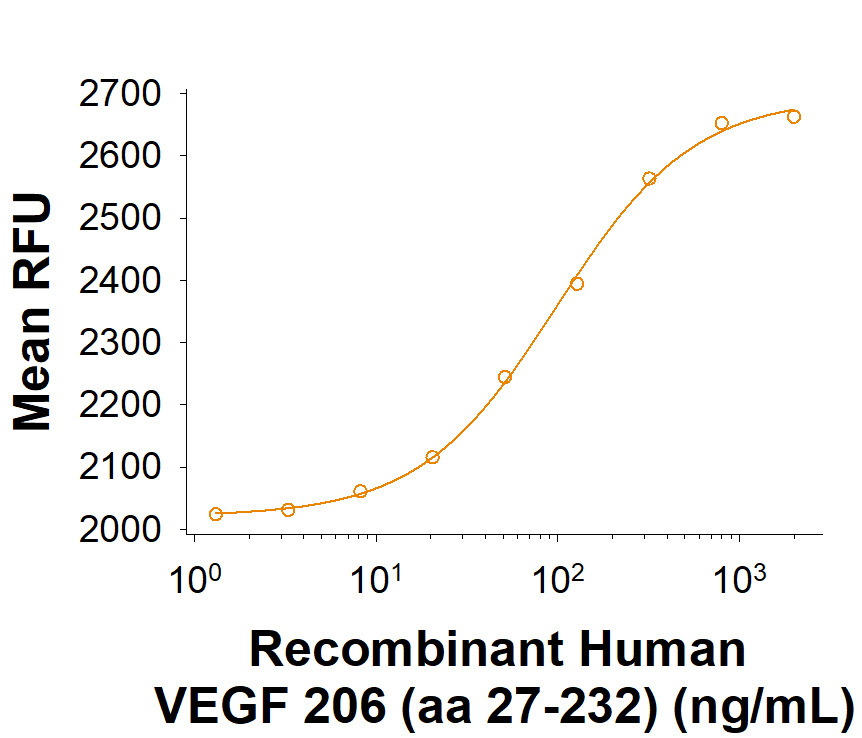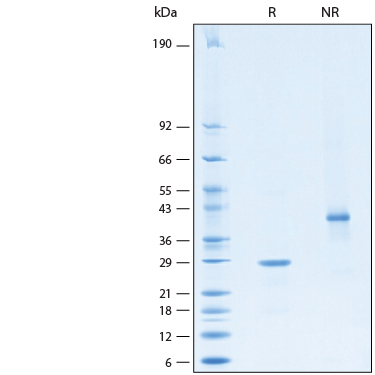Recombinant Human VEGF 206 (aa 27-232) Protein, CF Summary
Product Specifications
Ala27-Arg232
Analysis
Product Datasheets
Carrier Free
CF stands for Carrier Free (CF). We typically add Bovine Serum Albumin (BSA) as a carrier protein to our recombinant proteins. Adding a carrier protein enhances protein stability, increases shelf-life, and allows the recombinant protein to be stored at a more dilute concentration. The carrier free version does not contain BSA.
In general, we advise purchasing the recombinant protein with BSA for use in cell or tissue culture, or as an ELISA standard. In contrast, the carrier free protein is recommended for applications, in which the presence of BSA could interfere.
10490-VE
| Formulation | Lyophilized from a 0.2 μm filtered solution in HCl. |
| Reconstitution | Reconstitute at 250 μg/mL in 4 mM HCl. |
| Shipping | The product is shipped at ambient temperature. Upon receipt, store it immediately at the temperature recommended below. |
| Stability & Storage: | Use a manual defrost freezer and avoid repeated freeze-thaw cycles.
|
Scientific Data
 View Larger
View Larger
Recombinant Human VEGF 206 (aa 27-232) Protein (10490-VE) stimulates proliferation of HUVEC human umbilical vein endothelial cells. The ED50 for this effect is 20-120 ng/mL.
 View Larger
View Larger
2 μg/lane of Recombinant Human VEGF 206 (aa 27-232) Protein (Catalog # 10490-VE) was resolved with SDS-PAGE under reducing (R) and non-reducing (NR) conditions and visualized by Coomassie® Blue staining, showing bands at 26-30 kDa and 38-44 kDa, respectively.
Reconstitution Calculator
Background: VEGF
VEGF 206 (Vascular Endothelial Growth Factor-A or VEGF-A) is a 48-kDa covalently linked homodimeric protein member of the PDGF/VEGF family of molecules (1, 2). They are characterized by the presence of eight conserved cysteine residues and a cystine knot structure (3). Also known as vascular permeability factor (VPF), VEGF is a potent mediator of both angiogenesis and vasculogenesis in the fetus and adult (4). VEGF-A mRNA undergoes alternative splicing events that generate several different isoforms, e.g. VEGF 121, VEGF 145, VEGF 165, VEGF 189, and VEGF 206 in humans (5). Whereas VEGF 188/189, 164/165, and 120/121 (rat/human, respectively) are the predominant forms expressed in most tissues and cells examined, VEGF 144/145 and 205/206 are rare variants. VEGF 144/145 is detected only in placenta, uterine tissues and endometrial carcinoma cell lines while VEGF 205/206 is detected only in fetal liver, placenta and adult lung (6).VEGF 206, the longest of all isoforms in human, along with VEGF 189 are highly basic proteins that bind to heparan sulfate both on the cell surface and in the extracellular matrix (ECM) where they retains bioactivity (7). VEGF binds the type I transmembrane receptor tyrosine kinases VEGF R1 (also called Flt-1) and VEGF R2 (Flk-1/KDR) on endothelial cells (4). Although VEGF affinity is highest for binding to VEGF R1, VEGF R2 appears to be the primary mediator of VEGF angiogenic activity (3, 4). VEGF is required during embryogenesis to regulate the proliferation, migration, and survival of endothelial cells (3, 4). In adults, VEGF functions mainly in wound healing and the female reproductive cycle (3). Pathologically, it is involved in tumor angiogenesis and vascular leakage (8, 9). Circulating VEGF levels correlate with disease activity in autoimmune diseases such as rheumatoid arthritis, multiple sclerosis and systemic lupus erythematosus (10). VEGF is induced by hypoxia and cytokines such as IL-1, IL-6, IL-8, oncostatin M and TNF-alpha (3, 4, 11).
- Woolard, J. et al. (2009) Microcirculation 16:572.
- Ferrara, N. et al. (2003) Nat. Med. 9:669.
- Robinson, C.J. and S.E. Stringer (2001) J. Cell. Sci. 114:853.
- Byrne, A.M. et al. (2005) J. Cell. Mol. Med. 9:777.
- Robinson, C.J. and S.E. Stringer (2001) J. Cell. Sci. 114:853.
- Burchardt T. et al. (1999) IUBMB Life. 48:405.
- Ferrara N. (2010) Mol Biol Cell. 21:687.
- Weis, S.M. and D.A. Cheresh (2005) Nature 437:497.
- Thurston, G. (2002) J. Anat. 200:575.
- Carvalho, J.F. et al. (2007) J. Clin. Immunol. 27:246.
- Angelo, L.S. and R. Kurzrock (2007) Clin. Cancer Res. 13:2825.
FAQs
No product specific FAQs exist for this product, however you may
View all Proteins and Enzyme FAQsReviews for Recombinant Human VEGF 206 (aa 27-232) Protein, CF
There are currently no reviews for this product. Be the first to review Recombinant Human VEGF 206 (aa 27-232) Protein, CF and earn rewards!
Have you used Recombinant Human VEGF 206 (aa 27-232) Protein, CF?
Submit a review and receive an Amazon gift card.
$25/€18/£15/$25CAN/¥75 Yuan/¥1250 Yen for a review with an image
$10/€7/£6/$10 CAD/¥70 Yuan/¥1110 Yen for a review without an image




